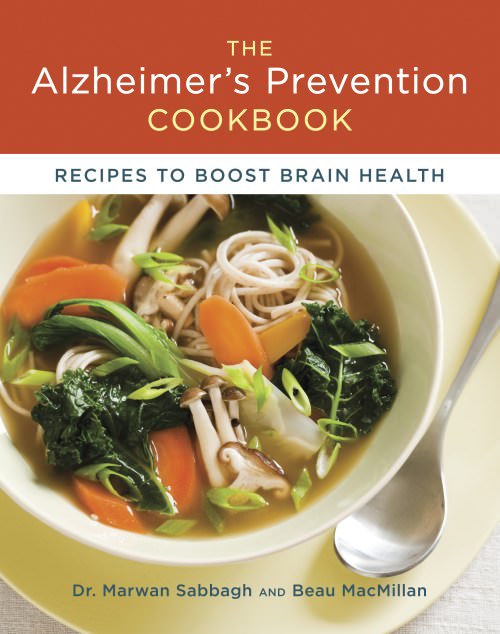The Caregiver’s Recipe for Prevention: An Ounce of Spice and a Whole Foods Mediterranean Diet
“My mother has Alzheimer’s. What can I do so I don’t get the disease?”
Frequently worried caregivers ask Marwan Sabbagh, MD, author of The Alzheimer’s Prevention Cookbook: Recipes to Boost Brain Health, that question. Dr. Sabbagh is a geriatric neurologist, dementia specialist and the Research Medical Director of the Banner Sun Health Research Institute in Arizona. He understands the concerns and fears of caregivers and he is able to offer them hope. 
“The changes in the brain that lead to Alzheimer’s or dementia start 25 years before the first day of forgetfulness,” Dr. Sabbagh says. “The dementia is at the end of the disease, not at the beginning.”
The more he researched the impact of spices and food on the brain, the more he realized the importance of diet in boosting brain health.
Foods are More Effective than Supplements in Protecting the Brain
* The nutritional values of food are well researched; the nutritional value of supplements varies widely from company to company.
* The body can break down food into small, transportable molecules that can permeate the brain’s protective barrier and reach the brain with the nutrients still intact; supplements aren’t as easily broken down and often cannot penetrate the blood-brain barrier.
“The road from our mouth to our brain is long and winding. Because of the way we digest food and nutrients, the best source of neurotransmitter precursors is almost always food; supplements are much less reliable,” Dr. Sabbagh writes.
Caregivers Need Nourishing Foods
“Caregivers take the disease on the chin,” Dr. Sabbagh says. “Their stress levels are higher than the people with Alzheimer’s.”
This stress weakens the immune system and puts them at risk for illness and disease.
Five Ways to Boost Your Brain Now
* Spice Up Your Life and Increase your Antioxidants
The spices that add the biggest boost of healing antioxidants include
cloves, oregano, rosemary, thyme, cinnamon and turmeric. Add turmeric to your eggs. Sprinkle cinnamon into your coffee or smoothie. Include rosemary in your salad.
* B is for Brain Health
“The three most important vitamins for brain health are B6, B9 and B12,” Dr. Sabbagh writes.
For B6, eat sunflower and sesame seeds, pistachios, bananas, spinach, and vegetable juices.
For B9, nibble on broccoli, kale, lentils, peas, and strawberries.
For B12, eat eggs, shellfish or fatty fish. For vegetarians, take a supplement.
* Dine Mediterranean Style
Reduce red meat, decrease saturated fats; add more fish and fruits and vegetables. The more fruits and vegetables, the healthier the brain.
* Believe it Can Happen
“You have to make a commitment to incorporate healthy eating into your life,” Dr. Sabbagh advises. “Part of this is psychological. If you believe this is hard, that belief will make it hard. It you believe that a whole foods diet is part of who you are and how you live, you can easily weave healthy eating into your life.”
* Don’t’ Wait: start today.
***
Q for U:
How do you add nourishing foods and spices into your daily diet?
***
For more information about boosting brain health, visit Dr. Sabbagh’s website:
http://www.marwansabbaghmd.com
Read his book The Alzheimer’s Prevention Cookbook: Recipes to Boost Brain Health, written with world-famous chef Beau MacMillan.

excellent topic! I’m going to pass this on to several meat-eating friends.
Thanks, Deborah Helen
How timely for me, with my mother at 94, now with Dementia, and me at 72 right behind her. I’ve done some things right, but need to expand my knowlege of food. Thank you Deborah for making this journey available to the rest of us.
Penny Pederson